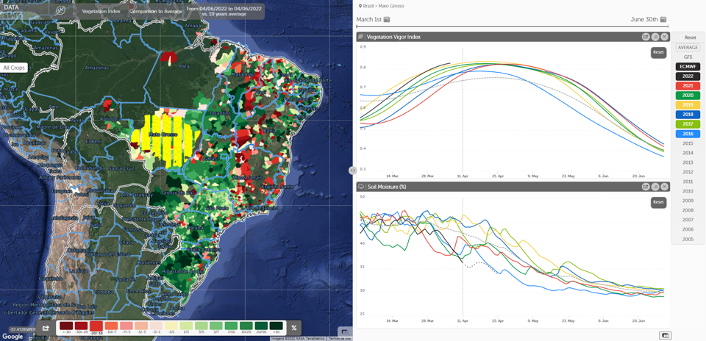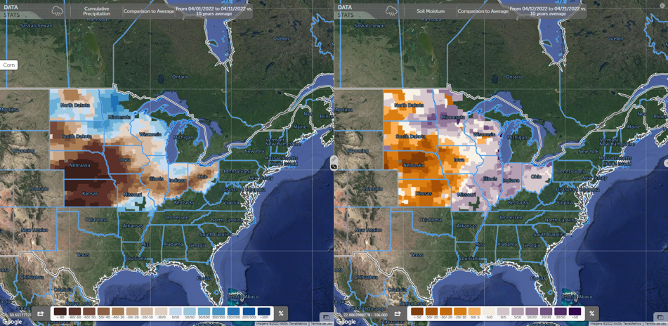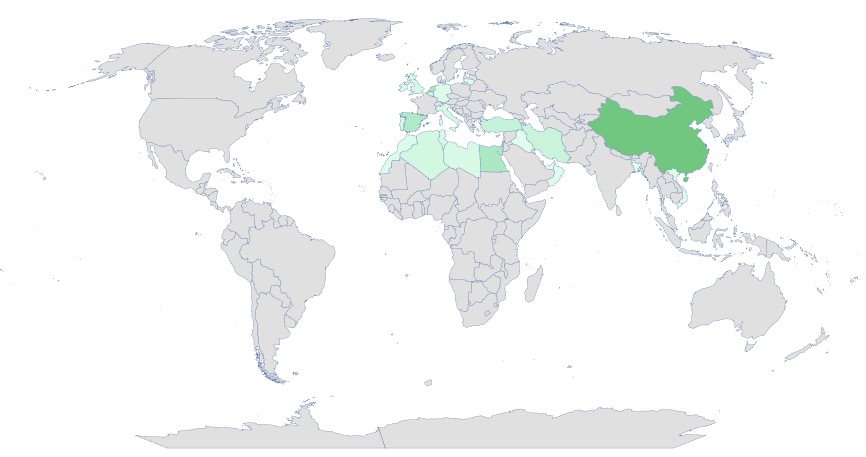
Examining Global Corn Supply Disruption Amid the Russia-Ukraine War
Today’s global food supply chain is highly connected, and the current war in Ukraine has created a tangible disruption in worldwide food security — specifically when it comes to wheat, corn, barley, sunflower/rapeseed and fertilizer. In response, EarthDaily Analytics and its EarthDaily Agro agriculture division are harnessing the power of Earth Observation technology to actively monitor crop health around the world. Through this monitoring, EarthDaily is able to detect early warning signs of production distress, equipping food security organizations to take proactive action.
Under this initiative, EarthDaily is creating a series of crop monitoring reports. Each report focuses on a different crop and its health across major producing countries as well as potential impacts to dependent importing countries. The first report, released March 31, focused on wheat. Today, EarthDaily has released the second report in the series, focused on production and importing for corn.
Access The Full Reports Now
Key findings on global corn production
The top producers of corn outside Ukraine and Russia are the U.S., Canada, Brazil, Europe, India, China, Argentina and Australia. The report’s findings suggest that world corn production is currently uncertain due to a combination of factors. Globally, the major regions where corn is either currently in season or soon will be include the U.S. and Brazil. Because the current crop is still in early stages, ultimate production is largely unpredictable at this point in time. Most likely, a large determining influence will be precipitation levels in the U.S. and Brazil over the coming months.
Low moisture may impact Brazilian corn production

EarthDaily data shows that continued attention to Brazilian precipitation is needed.
Brazil is currently in the middle of its Safrinha, or second-crop, corn season. To-date, precipitation has been on the lower side across the region yet still sufficient as of now. However, potential does exist that low moisture could begin to impact the crop’s health as it continues to grow.
Varying moisture levels in the U.S. underline uncertainty

EarthDaily data shows that moisture conditions vary widely across the U.S.’s corn-growing regions
Meanwhile in the U.S., planting is about to begin soon. Growers will be starting the season with varying conditions across the region. In the Western Corn Belt, soil moisture is below average, which may create challenges if conditions do not improve. Conversely, the Eastern Corn Belt is actually experiencing wetter conditions than normal. As such, precipitation levels across the country will bear a large influence on the outcome of the crop.
While global corn production is not currently of high concern based on the current report, it does warrant attention. EarthDaily will continue to actively monitor growing conditions.
Key findings on global corn imports

Globally, a number of countries source corn from Ukraine.
When it comes to corn imports, the report finds that four countries’ supplies may be at risk due to historical reliance on Ukrainian and Russian corn. Ukrainian corn production will be greatly diminished this year, and the following four countries will likely have the most pressing dependence on other producers to help fill gaps.
- China: More than half of China’s corn imports come from Ukraine. Domestic production is expected to be satisfactory, as soil moisture in the region is currently adequate.
- Egypt: 26% of Egypt’s corn imports come from Ukraine. Domestic production is expected to be healthy, as soil moisture in the region is currently above average.
- Iran: Iran is highly dependent on imports to fulfill its corn needs, producing only 16% of its supply domestically. 21% of the country’s corn imports are sourced from Ukraine.
- Israel: None of Israel’s corn supply is domestically produced, as the country relies exclusively on imports to fulfill its needs. 25% of the country’s corn imports come from Ukraine.
Access the full report
EarthDaily Analytics is actively working with customers both inside and outside Ukraine to ensure they are maximizing their crop yields within the context of the anticipated global shortfalls that lend increased importance to each incremental unit of production.
Organizations interested in learning more are encouraged to access the full Global Corn Overview Report and Corn Buyer Monitoring Report. For additional information, contact EarthDaily Analytics. The next report in this series will be released Friday, April 29.
